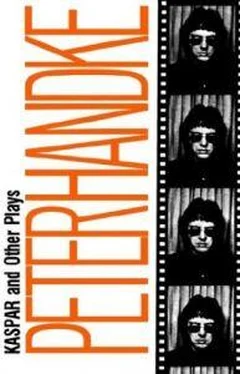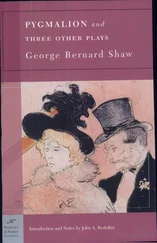Peter Handke - Kaspar and Other Plays
Здесь есть возможность читать онлайн «Peter Handke - Kaspar and Other Plays» весь текст электронной книги совершенно бесплатно (целиком полную версию без сокращений). В некоторых случаях можно слушать аудио, скачать через торрент в формате fb2 и присутствует краткое содержание. Год выпуска: 1970, Издательство: Farrar Straus Giroux, Жанр: Драматургия, на английском языке. Описание произведения, (предисловие) а так же отзывы посетителей доступны на портале библиотеки ЛибКат.
- Название:Kaspar and Other Plays
- Автор:
- Издательство:Farrar Straus Giroux
- Жанр:
- Год:1970
- ISBN:нет данных
- Рейтинг книги:4 / 5. Голосов: 2
-
Избранное:Добавить в избранное
- Отзывы:
-
Ваша оценка:
- 80
- 1
- 2
- 3
- 4
- 5
Kaspar and Other Plays: краткое содержание, описание и аннотация
Предлагаем к чтению аннотацию, описание, краткое содержание или предисловие (зависит от того, что написал сам автор книги «Kaspar and Other Plays»). Если вы не нашли необходимую информацию о книге — напишите в комментариях, мы постараемся отыскать её.
Waiting for Godot
In
and
, one-character "speak-ins," Handke further explores the relationship between public performance and personal identity, forcing us to reconsider our sense of who we are and what we know.
Kaspar and Other Plays — читать онлайн бесплатно полную книгу (весь текст) целиком
Ниже представлен текст книги, разбитый по страницам. Система сохранения места последней прочитанной страницы, позволяет с удобством читать онлайн бесплатно книгу «Kaspar and Other Plays», без необходимости каждый раз заново искать на чём Вы остановились. Поставьте закладку, и сможете в любой момент перейти на страницу, на которой закончили чтение.
Интервал:
Закладка:
XXII
The spotlight follows Kaspar’s hand, which, by pushing up the jacket, approaches the belt, which may be very wide. The spotlight follows Kaspar’s other hand, which also moves toward the belt. One hand slips the belt end out of very many belt loops. One hand holds the prong of the buckle while the other draws the belt away from the prong. This hand pulls the belt tight while the other hand puts the prong through the next hole. The belt end, which has become even longer through the tightening of the belt, is again passed carefully through the many loops until the pants fit as they should obviously fit. The spotlight darkens. A sentence which demands a question is uncomfortable: you cannot feel at ease with such a sentence. What matters is that you form sentences that you can at least feel at ease with. A sentence which demands another sentence is unpretty and uncomfortable. You need homely sentences: sentences as furnishings: sentences which you could actually save: sentences which are a luxury. All objects about which there are still questions to be asked are disorderly, unpretty, and uncomfortable. Every second sentence ( the words are timed to coincide with the loops through which Kaspar is passing the belt ) is disorderly, unpretty, uncomfortable, irksome, ruthless, irresponsible, in bad taste.
XXIII
The spotlight follows Kaspar’s hand which is buttoning his jacket from top to bottom. One button is left over at the bottom. The spot points to the leftover button, as does Kaspar’s hand. Then it follows the hand as it unbuttons the jacket from bottom to top, but more rapidly than it buttoned it. Then it follows Kaspar’s hand as it buttons the jacket once more, even more quickly. This time he succeeds. The spot and Kaspar’s hands both point to the bottommost button. Then the hands release the button. The spot reveals that everything is in order. Then it goes out Every object must be the picture of an object: every proper table is the picture of a table. Every house must be the picture of a house. Every proper table is (the words are timed to coincide with the buttoning) orderly, pretty, comfortable, peaceful, inconspicuous, useful, in good taste. Each house ( the words coincide with the buttoning ) that tumbles, trembles, smells, burns, is vacant, is haunted is not a true house. Every sentence ( the words again coincide with the buttoning ) which doesn’t irk, doesn’t threaten, doesn’t aim, doesn’t ask, doesn’t choke, doesn’t want, doesn’t assert is a picture of a sentence.
XXIV
The spot shines on Kaspar. It is obvious that his jacket does not match his pants, either in color or in style. Kaspar just stands there. A table is a true table when the picture of the table coincides with the table: it is not yet a genuine table if the picture of the table alone coincides with the table whereas the picture of the table and chair together do not coincide with the table and chair. The table is not yet a true, actual, genuine, right, correct, orderly, normal, pretty, even prettier, spectacularly beautiful table if you yourself do not fit the table. If the table is already a picture of a table, you cannot change it: if you can’t change the table, you must change yourself: you must become a picture of yourself just as you must make the table into a picture of a table and every possible sentence into a picture of a possible sentence.
XXV
Kaspar puts the stage in order. While the spotlight follows him and everything he does, he moves from one object to the other and corrects whatever harm he has done to it. Moreover, he puts the objects into their normal relationships toward each other, so that the stage gradually begins to look inhabitable. Kaspar creates his own ( three ) walls for himself. His actions are accompanied by sentences from the prompters. At first these sentences are adjusted to Kaspar’s movements, until Kaspar’s movements gradually begin to adjust to the movement of the sentences. The sentences clarify events on the stage, of course without describing them. There is a choice among the following sentences. Each of his steps and movements is something new to which the spotlight calls attention. Occasionally he accompanies his actions with sentences. Every interruption of the action produces an interruption of the sentence. Every repetition of an action produces a repetition of the sentence. As he nears the completion of his task, his actions more and more obey the sentences of the prompters, whereas in the beginning the prompters’ sentences adjusted themselves to his actions. First of all, Kaspar rights the chair on which he had been sitting, saying, for example: I am righting the chair and the chair is standing. He goes to the second chair and raises it, this time with one hand. The spot shines on the hand, which holds on to a vertical rod on the backrest: I am putting up the second chair: I can count. The first chair has two rods. The second chair has three rods: I can compare. He squats down behind the chair and embraces the rods with both hands. He shakes them: everything that is barred with rods is a chair. One rod breaks in half. He quickly puts the two halfs together again: Everything that breaks is only a rod in a chair. Everything that can be covered up is only a rod in a chair. He walks to the large table. This time, before he kneels down, he pulls his pants up over his knees: I pull my pants up over my knees so they won’t get dirty. He quickly picks up what had fallen out of the drawer: Everything that cuts is only a table knife. Everything that lies face up is a playing card. He tries picking up a match with his whole hand. He fails. He tries with two fingers and succeeds: Everything I can’t pick up with my whole hand is a match. He quietly pushes the drawer into the table. He still has the match in his hand. He sees another match on the floor. He picks it up, whereupon the match in his hand drops. He picks it up, whereupon the second match falls out of his hand ( the movements are very precise, the spot follows ). For the first time he uses his other hand to pick up the match. He holds the two matches in his two fists. He no longer has a hand free to open the drawer. He stands before the drawer. Finally he gives the match from one hand to the other hand: I can hold one hand free. Everything that can move freely is a hand. He opens the drawer wide, with one hand. He puts the matches in the drawer, pushing the drawer shut with the other hand, whereupon the first hand gets caught in the drawer. He pulls on the caught hand while pushing in with the other hand, exerting himself more and more in both endeavors. Finally he is able to free his hand with one violent pull while the other hand, with one violent push, pushes in the drawer. He does not rub his hand but moves on immediately, righting the rocking chair, which had fallen near the table, almost in one movement with the bang of the drawer as it is shut. Immediafely afterward he leans the broom against the wall. Almost before the audience has time to realize it, he is kneeling before the three-legged able replacing the leg, all his movements being rapidly followed by the spotlight. As he moves, he says, also very rapidly: Everything that bangs is only a table drawer: everything that burns is only a chapped lip: everything that puts up resistance is only a fallen broom: everything that gets in the way is only a snowdrift: everything that rocks is only a rocking horse: everything that dangles is only a punching ball: everything that can’t move is only a closet door. In the meantime he has marched to the closet door and banged it shut. But it won’t stay shut. He slams it shut again. It slowly opens again. He pushes it shut. As soon as he lets go of it, it opens up again: Everything that doesn’t close is a closet door. Everything that frightens me is only a closet door. Everything that hits me in the face is only a closet door. Everything that bites me is only a closet door. ( Each of these sentences coincides with Kaspar’s attempts to slam or push the door shut. ) Finally he leaves the closet open. He goes to the sofa, puts it back in order, at the same time shoving it completely n stage. The spotlight precedes him, designating the place where the sofa should stand. Two other spots precede him, showing where the two chairs should stand. He puts the chairs there. ( The spotlights are of different colors. ) Another spot designates the place for the rocking chair. He follows it and places the rocking chair in its appointed spot. Another light already indicates the place for the little table. He puts it there. Another spot appears, designating the appropriate place for broom and shovel. He wants to put them there but the spot moves on and he follows it. It goes backstage and he follows it there with shovel and broom in hand. The spot returns without him and is already fixed on a place on the stage when Kaspar returns. In his arms he holds a large vase with flowers. He puts the vase in the designated place. Another spot indicates a place on the little table. Kaspar leaves the stage and returns with a plateful of decorative fruit. He puts it on the little table. Another spot designates an empty place in the corner of the stage. He leaves the stage and returns with a small stool. He puts it in its appointed place. Another spot indicates an empty area on the backdrop. He gives a sign to the tage-rigging loft and a painting is lowered onto the empty area. (What the painting represents is of no importance as long as it goes with the furnishings.) Kaspar irects it until it hangs perfectly. He stands there. Another spot walks ahead of him to the open closet. It lights up the clothes. Kaspar goes to the closet. Quickly he takes off his jacket, but finds no place to put it. The spotlight goes backstage and he follows it with the jacket over his arm. He returns with a clothes tree and hangs the jacket up on it. He walks to the loset and picks out another jacket, puts it on, buttons it. He stands there. He takes off his hat. He hangs the hat up on the clothes tree. The stage becomes increasingly more colorful. He has now begun to move in rhythm to the sentences from the prompters. A continuous sound has set in softly. It now becomes louder. It is apparent that the jacket goes with the pants and the other objects. Everything on stage goes with verything else. For a moment Kaspar looks Like a dummy at an interior-decoration exhibition. Only the open closet disrupts the harmony of the picture. The continuous tone becomes even louder. Kaspar stands there and lets people look him over. The stage is festively lit. Everyone is born with a wealth of talents. Everyone is responsible for his own progress. Everything that does harm is made harmless. Everyone puts himself at the service of the cause. Everyone says yes to himself. Work develops an awareness of duty in everyone. Each new order creates disorder. Everyone feels responsible for the smallest mote of dust on the floor. Whoever possesses nothing replaces his poverty with work. All suffering is natural. Every working man must be given leisure time in accordance with his need to replenish the energy expended while working. Everyone must build his own world. Example is a lesson that all men can read. A foolish consistency is the hobgoblin of little minds. Good order is the foundation of all things. A fanatical desire for order does not have to lead to a coup d’etat. Every step extends one’s perspective. That table is a meeting place. The room informs you about its inhabitant. An apartment is a prerequisite for an orderly life. Flowers should stand there as though they had a common center. Don’t stand if you can sit. Bending down expends more energy than anything else. A burden is lighter the closer it is held to the body. Put only things you don’t use often into the top shelves. Saving means saving energy. Balance the weight on both arms. The table won’t run away from you. Always take a fresh look at your work. Only if you’re healthy can you achieve a lot. Disorder outrages all decent thinking men. One of the most beautiful things in life is a well-set table. The furnishings should complement you. Apportion your time correctly. A place for everything and everything in its place. Happy are those who have steered a middle course. Nothing is given to you in life. The fingernails are a special index of order and cleanliness. Suggest with a friendly smile that you like your work. What has always been the way you find it, you won’t be able to change at once. Everyone must be able to do everything. Everyone should be completely absorbed in his work. Everything that appears to harm you is only in your best interest. You should feel responsible for the furniture. Sweep the floor in the direction of the boards. When you clink glasses, they should ring clearly. Every step must become completely natural to you. You must be able to act independently. Outside show is a poor substitute for inner worth. The merit of originality is not novelty; it is sincerity. The golden rule in life is moderation in all things. There’s nothing in this world constant but inconstancy. A bad beginning makes a bad ending. Circumstances are beyond the control of man; but his conduct is in his own hands. In an orderly room the soul also becomes orderly. Every object you see for the second time you can already call your own The relativeness of means is your basic principle. Running water does not become stagnant. A room should be like a picture book. Sitting all your life is unhealthy. A room should have a timeless character. You must show confidence in your work. There are no woodworms in the door hinges. You must be able to be proud of what you have achieved. Your well-being is determined by your achievement. The floor makes a decisive difference in the overall impression of the room. What matters is to be with it. Doors lock, but also constitute connections to the outside world. The objects must supplement your image. All work is what you make of it. The order should not be a soul-less order. You are what you have. Living in a dark room only brings necessary thoughts. The order of the objects creates all prerequisites for happiness. What is a nightmare in the dark is joyous certainty in the light. Every order eventually looses its terror. You’re not in the world for fun.
Читать дальшеИнтервал:
Закладка:
Похожие книги на «Kaspar and Other Plays»
Представляем Вашему вниманию похожие книги на «Kaspar and Other Plays» списком для выбора. Мы отобрали схожую по названию и смыслу литературу в надежде предоставить читателям больше вариантов отыскать новые, интересные, ещё непрочитанные произведения.
Обсуждение, отзывы о книге «Kaspar and Other Plays» и просто собственные мнения читателей. Оставьте ваши комментарии, напишите, что Вы думаете о произведении, его смысле или главных героях. Укажите что конкретно понравилось, а что нет, и почему Вы так считаете.












